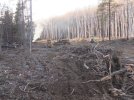Country_hick
Member
I need to clear several acres that used to be fields and to remove 3 beaver dams. It will take me quite some time to get it done which makes renting cost ineffective. I would go with a backhoe except I know it would sink into the wet ground.
I was looking at a GEHL until I found out there is no dealer support in my area. No dealer support means I need to find a different machine that does have dealer support.
How much difference is there in the ability to move dirt and dig out stumps between a 3, 4, and 5 ton excavator? Is it worth getting a 5 ton over a 3 ton considering the bigger one likely has more expensive parts and uses more fuel? Is resale better for one of these weight classes or are they all about the same?
I plan on going with a brand name machine with local support. That would include Kubota, John Deere, Cat, Volvo, Yanmar, and Wacker Neuson that I am aware of.
When do well maintained mini-excavators usually need repairs and what typically breaks? Do rubber tracks usually last a long time if they are not cut up by going over sharp rocks or stumps?
I was looking at a GEHL until I found out there is no dealer support in my area. No dealer support means I need to find a different machine that does have dealer support.
How much difference is there in the ability to move dirt and dig out stumps between a 3, 4, and 5 ton excavator? Is it worth getting a 5 ton over a 3 ton considering the bigger one likely has more expensive parts and uses more fuel? Is resale better for one of these weight classes or are they all about the same?
I plan on going with a brand name machine with local support. That would include Kubota, John Deere, Cat, Volvo, Yanmar, and Wacker Neuson that I am aware of.
When do well maintained mini-excavators usually need repairs and what typically breaks? Do rubber tracks usually last a long time if they are not cut up by going over sharp rocks or stumps?



